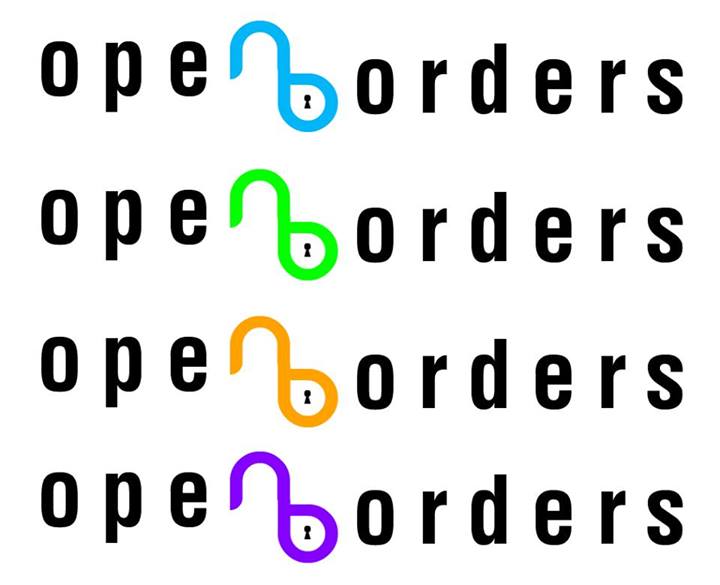Tyler Cowen of Marginal Revolution recently graced us with a pretty bracing set of criticisms:
In my view the open borders advocates are doing the pro-immigration cause a disservice. The notion of fully open borders scares people, it should scare people, and it rubs against their risk-averse tendencies the wrong way. I am glad the United States had open borders when it did, but today there is too much global mobility and the institutions and infrastructure and social welfare policies of the United States are, unlike in 1910, already too geared toward higher per capita incomes than what truly free immigration would bring. Plunking 500 million or a billion poor individuals in the United States most likely would destroy the goose laying the golden eggs. (The clever will note that this problem is smaller if all wealthy countries move to free immigration at the same time, but of course that is unlikely.)
Co-blogger Nathan Smith has already taken Tyler to task on the economics, asking Tyler specifically if keyhole solutions like immigration tariffs would address his concerns about the risks of open borders. Tyler issued a laconic response, which referred to Nathan’s suggestions as “surrender”, presumably because any sort of immigration restriction is inconsistent with open borders. Nathan has already updated his post to address Tyler’s riposte. Since we have covered the economics around Tyler’s thinking fairly comprehensively already, I want to tackle something different: exploring what we mean by open borders, and why an open borders agenda (as opposed to some generic “liberal immigration policy”) matters.
But first off, as reasonable as Tyler’s critique may be, I find it strange in how it implies that restrictionist myths and urban legends deserve more credence than any economist would give them. The tone of Tyler’s criticisms about the risks of open borders strikes me as slightly reminiscent of Paul Krugman’s tone on macroeconomic policy: worded just so, to avoid falling afoul of the economics, without really dissuading people from mistaken beliefs about what the economics says. Paul Krugman hardly ever directly contradicts the mainstream economist consensus that monetary policy can be effective at the zero lower bound. But if you ask any layperson reading Krugman what Krugman believes about the efficacy of monetary policy when interest rates are low, I’d bet you the median layperson thinks Krugman believes monetary policy is totally ineffective, making fiscal policy the only game in town.
Likewise, if you ask him, Tyler is all for liberal immigration policies (as he said himself, right before launching into his critique). He doesn’t buy into the myths that immigrants are fatal drains on the welfare state, or deadly threats to the working class of the developed world. The prevalence of these two myths, in the face of all the economic evidence, is depressingly common; it is as if the lay person believed “all Chinese are opium addicts” or “deporting Jews will reduce the prevalence of poisoned wells”. Like numerous other economists, Tyler has explicitly declared he repudiates the popular scaremongering myths about immigration’s economic effects. It is all the more surprising then that he declares “people should be scared” of open borders — when, as he’s said time and time again, the main reasons people fear immigration have nothing to do with fact.
To solidify his critique, Tyler says that he is in particular worried about a scenario where:
- The US is the only country that opens its borders
- The US opens its borders essentially overnight (i.e., from highly restrictive one day to highly liberal the next)
But other than as thought experiments, I daresay you won’t find any blogger on this site who would say “Yes, that’s a regime I’d be happy with and world that I’d gladly sign up to live in, because the risks are so obviously worth it!” There’s more than one way to skin a cat. There are plenty of ways to gradually open the world’s borders while mitigating their risks. Here, the three most obvious options off the top of my head, with links to prior Open Borders posts where we’ve explored them (those posts are far from the final word, but they show just how untapped an intellectual well this area of thought is):
- Have a steadily increasing immigration quota
- Establish free movement unions or areas, similar to customs unions or free trade areas
- Abolish deportation as a form of punishment, except in extreme cases
All three options are eminently practical ways of achieving open borders which address the perennial question, “But what on earth would you do with 500 million new American residents tomorrow?” And there are plenty of other practical ways to open the borders; I see no reason to wed ourselves to a particular approach. Maybe some countries will only be able to open their borders via guest worker visa regimes. Maybe others will only be able to open their borders via immigration tariffs or surtaxes of some kind. Still others may be able to get away with true open borders. And I’m confident many countries are capable of mixing and matching. You can imagine a North American free movement union between Canada and the US (or perhaps even, as Barry Goldwater envisioned, such a zone that includes Mexico) which imposes a different regime on immigrants from other countries. The destruction of all conventional immigration policies on some longer timeframe than “within the next 24 hours” is something I’d be happy to see. But even that is only one possible means to the end of open borders.
At this point, you’re probably either scratching your head, or nodding it in agreement with Tyler’s point from earlier about surrender, because what I’ve just outlined may well strike you as utterly inconsistent with the label of “open borders”; after all, what is open borders if not a total rejection of conventional immigration policies? But I don’t define open borders as one particular policy regime or one particular set of immigration laws. I define open borders simply as the principle that, subject to clearly-defined (i.e., not wishy-washy, unclear, or opaque) necessary constraints, people are free to travel, live, and work wherever they want. I am happy to accept any policy regime that satisfies this principle.
Tyler’s critique focuses on an airy-fairy type of open borders which any reasonable person can see is not going to happen, and likely shouldn’t happen at all. So while we’re at it, we might as well criticise a single world government too, since that’s also going to be an absurdly impractical and unreasonable way to open the borders. Where I find Tyler’s critique goes astray is that it focuses on one particular means of opening the borders, instead of the end itself — thereby lending more credence to restrictionist myths about the evils of open borders.
Ultimately, open borders is an end; it is the freedom to author your own life story. It is about being able to sleep safe in your own home, with your family, amongst your community of friends, knowing the government doesn’t have the arbitrary and unchecked power to take you away from all of them tomorrow morning. It is about being safe in the knowledge that the job your employer hired you to do can’t be eliminated by government fiat tomorrow because you made the mistake of being born in the wrong country. All of these are rightful ends for anyone to aspire to. They may well be unattainable on some level, but that is no reason to reject open borders out of hand, any more than the infeasibility of economic “perfect competition” constitutes a reason to reject economic liberalisation. Rejecting open borders because you reject one possible open borders policy is an oddly narrow-minded approach unworthy of an economist or thinker of Tyler’s stature. Even mainstream immigration liberals who remain skeptical of open borders like Matt Yglesias find Tyler’s stance here bemusing.
I can imagine no better label for a world with freedom of movement than a world of open borders. What else captures the sentiment so concisely? If Tyler is so unhappy about calling the goal of free movement “open borders”, he’s free to propose a catchier title. But I really don’t think freedom of movement is something Tyler opposes. He may well have ideas about how to achieve open borders that don’t jive with mine. That’s fine. I’m happy to have a debate about how to achieve open borders. I think Tyler’s on the same page with me here, which is why he kicked off this debate about whether rhetorically, the open borders label is tactically useful.
But while Tyler’s gotten to that point, what concerns me more right now is how far the rest of the world is from reaching that point. Most people don’t give a second thought to the fact that people die every day thanks to the governments we elect and the taxes we pay. We so blithely accept that the state has total, virtually unlimited power to abuse innocent and unarmed civilians. It’s one thing to disregard a destitute person living in, say, Zambia. None of us is responsible for giving that person a job, or for preventing that person from finding work in Zambia. But it’s a completely different thing to disregard how our tax-funded armed forces treat that person as a life-threatening enemy of the state, simply because he or she tried to find work in our country.
When it’s our money and our political authority being used to prevent that person from finding or holding down a job someone in our country is willing to hire them to do, I have a huge problem with that. The use of armed force against armed force is one thing. The use of armed force against civilian job-seekers or civilians seeking to be with their family is another; it is galling. We would never accept it against those born in our own country. Why do we so easily accept bringing tanks and gunships to bear against those innocents born outside our own country? Once we accept that this is a problem, we might still conclude that there’s no reasonable solution to the immigration problem, and that current policy to risk the lives of unarmed civilians is the best we can hope for. But most people, unlike Tyler, aren’t even willing to accept that this is a problem!
Given Tyler’s libertarian leanings, I imagine he won’t disagree much with me on these points. So it’s all the more puzzling to me then that he slips into the trap of encouraging popular fallacies used to justify the torture and slaughter of innocent immigrants. As Tyler points out, people fear the risks of more liberal immigration. But they will be fearful whether you call it “amnesty”, “comprehensive immigration reform”, or “open borders”. And their fears, in almost every single case, will be far more grounded in speculation and conjecture than any empirical fact. Tiny, statistically insignificant effects on a subsegment of the native working population will be blown up into “They took our jerbs!”-style paranoia. Economists quite bravely stuck their necks out for the cause of free trade, despite knowing the popular fears and risks. What keeps them from preaching the same consensus they’ve reached on immigration?
Putting modern economics aside, reasonable people in the US once feared letting blacks into the labour market (they had this “reasonable” fear that freed blacks would lynch them in retaliation for centuries of slavery — for what it’s worth, a more reasonable fear than the notion that Latin American immigration would turn the US political system into that of Chavez’s Venezuela). Pretty reasonable people once feared the impacts of letting women into the labour market. People fear any kind of change. Citing fears instead of facts is no way to make a reasonable policy argument.
It’s not news to anyone that the notion of open borders is scary. Dramatic policy changes should scare any reasonable person, because that’s only human. But scariness in of itself is not a plausible reason to come down firmly on one side or another. Many historical struggles for justice and human rights were shockingly frightening. Abolishing slavery or allowing women into the labour market constituted far more radical and scary reforms than would be dramatically liberalising immigration quotas, or dramatically halting most deportations. You tell me, what’s more dangerously untried and radical: allowing an illiterate, newly-freed black to buy his own land and farm his own crops in 1870; allowing a woman to build an aeroplane in 1940; or allowing a Pole to work on a UK construction site in 2010?
And on the flip side, it’s impossible to ignore how radically totalitarian is the immigration status quo. None of us can condone an immigration system that bans a woman from attending her daughter’s wedding because it suspects she’ll want to immigrate (never mind that, legally present or not, she won’t be eligible for most state entitlements). None of us can condone a legal system that gives government uncontrolled, unchecked, arbitrary power to destroy jobs, families, and homes in one fell swoop. I can’t see anyone signing up to defend a legal system that arbitrarily decides who you can love or who you can work for based on which emperor technically ruled the piece of dirt your ancestors happened to live on two centuries ago.
As the recent tragedy at Lampedusa, Italy illustrates, our legal systems often as good as murder people — people whose lives are so full of suffering that they willingly risk death to immigrate to our jails. We force people to choose between dying in sweatshops or dying at the hands of our border patrols. As some Syrians trying to flee chemical warfare are learning first-hand today, our ostensibly humane laws declare that it is better to force people to be gassed by a dictator than to let them try to make ends meet in our countries. How is any of this not radical? How is it not frightening that we supposedly have to resort to these measures to make the world safe for “civilisation”?
Are we truly happy and safe today because our border guards force Bangladeshis to die in sweatshops and Syrians to suffocate under clouds of sarin? Yes, inasmuch as today’s policies are inefficient and inhumane, the right solution isn’t tearing down every guard post and every border fence in the world within the next 24 hours. But beginning to think about a good alternative to closed borders consistent with both security and dignity is surely a moral imperative. I don’t think any of us want to live in a world that has to destroy human rights in order to preserve them. The problem with the traditional liberal approach towards immigration reform is that, implicitly or explicitly, it embraces closed borders. It might want to open them a little, but it has no sound reasoning (other than “this feels right, I guess”) for picking a trade off point between open and closed borders.
Open borders matters because it is the only paradigm that rejects the fallacious and unethical presumptions of closed borders, and the only paradigm that provides a sound moral basis for moving towards liberal immigration policies in the first place. Open borders presumes a right to move, one that can be overridden as necessary. Closed borders presumes a total ban on movement, one that can be overridden as necessary — a ban nevertheless so strong, it has to be enforced by punishments that destroy mutual employment, family, and community relationships; punishments that sometimes result in the taking of human life. Tyler may well draw a different line than I, or many others, do about what sorts of immigration restrictions are necessary. But I believe we are all on the same page: that people should be free to move, and that this right should only be denied when clearly necessary.
Defenders of the status quo ban essentially assert that a fascist totalitarian regime which kills unarmed civilians is the only way to preserve civilisation and safeguard people’s lives and property. Maybe they think our policies should kill slightly fewer people per year, but they otherwise are comfortable with the status quo as it is. Baldly saying ,”We need to open the borders”, forces a rethink of how readily we can accept the status quo. We know there’s a problem today, a problem that costs the human race thousands of lives and billions of dollars every year. Have we truly explored every possible alternative to the totalitarian border regime we have today?
Writing off open borders as an unattainable goal without exploring all avenues we have to get there I think amounts to saying “It is just and right that we force people to die under a cloud of poison gas or in a sweatshop’s fiery inferno, because that is an appropriate punishment for daring to be born in the wrong country.” Sure, that’s a strawman, since no reasonable person wants to sign on to that trade-off. But that trade-off is exactly the one our governments make in our name every damn day, and it’s a trade-off they’re making based far more on “scary” prejudices than it is on any evidence or fact. Opening the borders is the only way we can put an end to the unholy, inhumane slaughter of innocents — the slaughter of slightly less fortunate people who, same as you and me, just want a better life for themselves and their family. Before we reject open borders, and say there’s nothing we can do to stop the killing and dying, let’s at least be sure we’ve covered all our bases.








